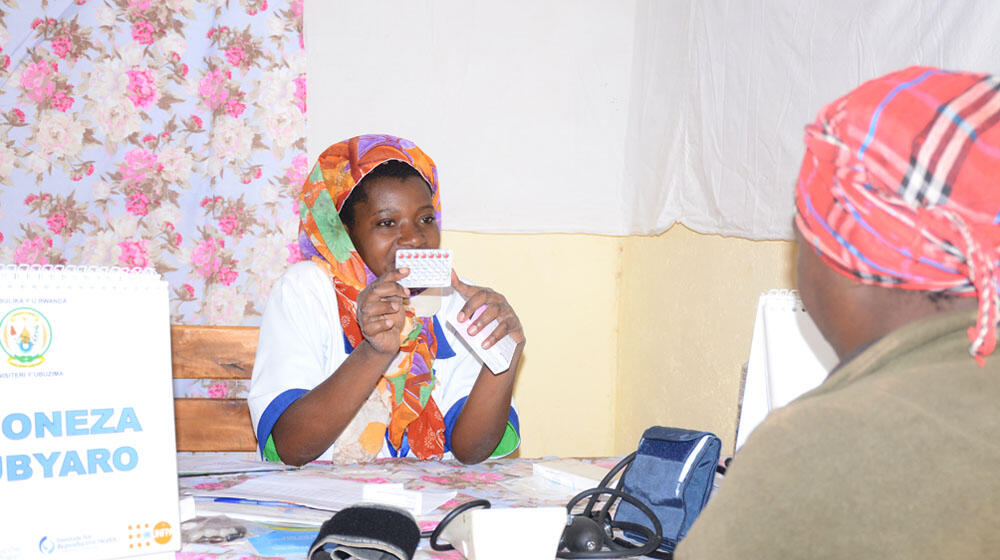On a sunny day, at Bugarama Health Center in Rusizi District, Ms. Nyiranzwinimana Ancille, who is 35 years old is sitting with a healthcare provider providing her antenatal care services. She looked tired, sweat trickling down her face yet with a big smile.
“5 years ago, Nyiranzwinimana had an abortion of her first pregnancy after experiencing some complications. Her doctor advised her on family planning so that she could plan on giving birth to another child without any problem. She is now 7 months pregnant and as you can see, she is healthy.” said Chantal Musabemariya, a healthcare provider.
“I did not know what to do! After losing my first pregnancy, I wanted to get pregnant again and have a child as soon as possible, but my life was in danger.” said Nyiranzwinimana
"Family planning gave me the opportunity to take care of myself and my husband".
Before using any family planning methods, Nyiranzwinimana had to discuss the benefits of family planning with her husband. As advised by the doctor, she needed time to take care of her health before getting pregnant again, and she could not do that without family planning methods.
“Even though it was difficult for him to understand, I took time to explain. We discussed and agreed to use the 3-year birth control implant, which allowed me to take care of myself and my husband before I get pregnant again.” Nyiranzwinimana said.
The Postpartum Family Planning (PPFP) is the prevention of unintended and closely spaced pregnancies for the first 12 months following childbirth and is among high impact interventions in Rwanda, where it has increased from 20% to 54% between 2015 and 2020 according to the recent Rwanda Demographic and Health Survey (DHS 2019/2020). This has significantly contributed to the increased modern contraceptive prevalence rate (mCPR) in Rwanda.
“3 years later, immediately after knowing I’m pregnant, I went back to the health center to get guidance from healthcare providers on the family planning methods I could use after giving birth. I received full information and I have already made a choice.” Said Nyiranzwinimana.
New commitments to expand access to family planning
Access to safe, voluntary family planning is about an individual’s human right. Family planning is central to gender equality and women’s empowerment, and it is a key factor in reducing poverty. Since 2012, the Government of Rwanda has played a crucial role in the FP2020 partnership when the country joined as one of the commitment-making countries.
Family Planning results have been encouraging as the uptake has increased from 53% to 64% for those who used any Family Planning contraceptive methods between 2015 and 2020 and from 48% to 58% increase for those who used modern contraceptive methods, according to RDHS 2019/2020.
Other achievements include:
- Increased Family Planning uptake among married women from 47.5% to 58.4% between 2015 and 2020,
- Unmet need for Family Planning decreased from 19% to 14% among all Women in Reproductive Age; and
- Maternal mortality rate decreased from 210 per 100,000 live births in 2015 to 203 per 100,000 live births in 2020.
On 28 April 2022, the Government of Rwanda through the Ministry of Health in partnership with UNFPA and other partners launched the new National Family Planning commitments to expand access to family planning for women and girls throughout the country over the next ten years.
“Building on the successes of the FP2020 partnership, we are ready to embark on the next decade of progress through the FP2030 to reduce maternal mortality and move forward the ICPD25 agenda to achieve the SDGs and Agenda 2063” Stated Kwabena Asante-Ntiamoah, UNFPA Rwanda Representative, at the Launch of Rwanda FP2030 commitments.
In making this commitment, Rwanda joins the FP2030 partnership, a global partnership that is working together to advance family planning around the world.
“These commitments are not far from the Rwanda political will in advancing sexual reproductive health including family planning. As per the Rwanda FP2030 commitments, we are planning to achieve more for the benefit of our people whereby we need to increase the uptake up to 65% for modern contraceptives by 2030.” Said Dr. Mpunga Tharcisse, Minister of State in Charge of Primary Health Care.
In 2019, at the Nairobi Summit on ICPD25, Rwanda committed to improve family planning services delivery, access, and uptake by expanding the available contraceptive method mix, including emergency contraceptives, in order to decrease unmet need for family planning.
The Ministry of Health through the Rwanda Biomedical Center leads the implementation of the Rwanda ICPD25 commitments, ensuring the availability of quality SRH commodities and services up to the last mile is highly appreciated.
UNFPA supports the government through this journey, with a focus on supporting policies, strategies and guidelines formulation to create an enabling environment, strengthening the supply chain of commodities up to the last mile, supporting key high impact interventions, pre and in service capacity building of health workers including medical doctors, nurses, midwives, and the Community Health workers towards ensuring the access to quality human right based Family Planning services within the health facilities and at the community level.


